On May 31, 2023, French President Emmanuel Macron gave a speech at GLOBSEC, a security conference organized by a think tank in the Slovak capital Bratislava, wherein he formalized his much-awaited opening to the East of Europe. Macron was once a proponent of rapprochement between Europe and Russia, much to the dismay of Central and Eastern Europeans, for whom NATO’s Article 5 security guarantee is existential. The speech at GLOBSEC conveys a sense of unity, defends a commonality of purpose for the future of the European Union and European security, and atonements for his and his predecessors’ neglect of Eastern Europe. In 2003, French President Jacques Chirac shocked his Eastern partners by declaring they had “lost an opportunity to keep their mouths shut,” in reference to their support of the U.S. intervention in Iraq. Macron is now saying that Western Europe lost an opportunity when it didn’t listen to the concerns relayed by the Eastern Europeans. And, in this symbolic gesture, he is also looking to bridge divergences inside the EU on the way forward for future integration.
German Chancellor Olaf Scholz had acknowledged the shift of Europe’s center of gravity to the East in his Prague speech in August 2022 in no uncertain terms: “The center of Europe is moving eastward.” If Paris didn’t assert it so openly, a shift was, in fact, occurring. Ukraine and Moldova were granted EU candidate accession status by the European Council in June 2022, followed by the Czechs’ hosting of the first meeting of the European Political Community (EPC) in Prague in October 2022.
The EPC was announced by Macron in a speech on May 9, 2022, as a way to move forward simultaneously on both enlarging and deepening the Union. The French have been known to be very reluctant proponents of EU enlargement, favoring a deepening and reform of the Union before opening it to others. This was a major point of contention between France and Germany as well as between the French and Eastern Europeans, until recently. The EPC is meant to be a platform to tackle a broad spectrum of security issues, from traditional security to critical infrastructure and energy connectivity. Many Eastern Europeans had initially interpreted this proposal as a French maneuver to prevent EU enlargement, and (even worse), to circumvent NATO.
Nonetheless, 44 countries participated in the October 2022 Prague meeting, no doubt motivated to overcome their misgivings and differences by their common abhorrence of Russian President Vladimir Putin’s full-scale aggression in Ukraine. The countries decided to meet every six months, with the host rotating between non-EU and EU member states. Moldova hosted the second summit on June 1, 2023. Forty-nine European leaders met in Bulboaca, Moldova for this second edition of the EPC, and Ukrainian President Volodymyr Zelenskyy joined too — proof that the very existence of the platform strengthens Europe as a whole. Since Moldova is very vulnerable to Russian political destabilization and potential aggression, the show of strategic solidarity displayed in Bulboaca was crucial for its security. It also contributes to the common strategic culture that Macron wants Europeans to share.
Macron’s speech in Bratislava last week had several purposes. Firstly, it was meant as tacit atonement for his previous overtures to Russia. He invited Putin to France in 2019 in an effort to relaunch a dialogue on the European security architecture — without prior notice to said Europeans — and since the beginning of the war in Ukraine he mentioned that Russia too should be provided with security guarantees and that it shouldn’t be humiliated. Secondly, the speech was intended to acknowledge how the contributions of Central and Eastern European countries have helped the EU become a stronger geopolitical actor. Macron said that their voices “must be the voice of all of us.” He referred to Chirac’s infamous comments too with a sentence that made the headlines in Europe: “Some told you then that you were missing opportunities to keep quiet — but I believe we sometimes missed opportunities to listen.”
Finally, the president wanted to reassure his listeners that France is indeed not seeking to build a European Union that excludes the new aspirants in Eastern Europe or pushes the trans-Atlantic alliance aside: “The European Political Community is neither a competitor to NATO nor a substitute for enlargement, but it is a framework for strategic discussion which all countries need in order to build, I hope, an innovative and new institutional architecture.” In a reference to his now-infamous 2019 comment that NATO was experiencing “brain death,” he added that Putin “woke [NATO] up with the worst electroshock.” Underlining the crucial role the United States plays in European security, he added that Europe needed to build better capacities, precisely to be a better partner to the United States. “Strategic autonomy” (a red-flag-term in the north and east of Europe) was mentioned just twice, as a synonym for “military sovereignty” in the framework of NATO and as the building block of a much-needed European defense industrial base.
The speech also addressed crucial issues in terms of how the EU and Ukraine’s fates are intertwined: the need to continue supporting Ukraine amidst a string of important elections and rising populism; how to prepare for a postwar settlement that does not endanger Ukraine or Europe’s security by encouraging Russian imperialism.
Macron being Macron, he doesn’t shy away from ambitious goals. He wants Europe to be at the table for the arms control discussion. He also confirmed that the conference on air defense, which he had announced at the Munich Security Conference in February 2023, would take place on June 19, 2023, in Paris, and he invited all EPC participating countries to attend it. One can be hopeful that the Macron method in foreign policy is taking a more inclusive turn and that Macron’s opening to Eastern Europe is now on track.
The Brookings Institution is committed to quality, independence, and impact.
We are supported by a diverse array of funders. In line with our values and policies, each Brookings publication represents the sole views of its author(s).

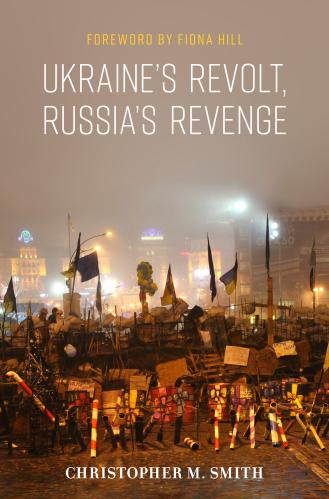

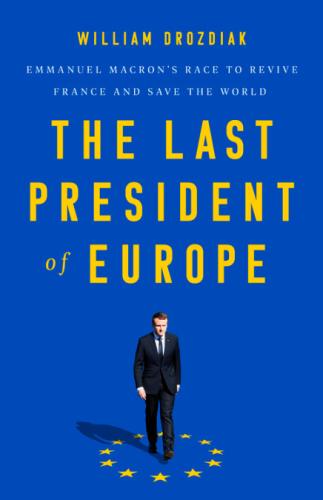
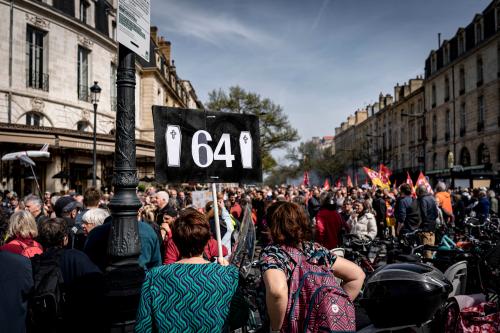
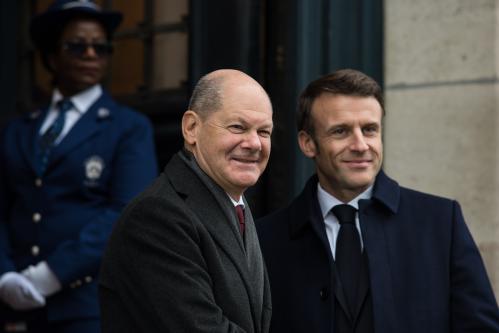
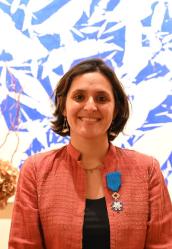
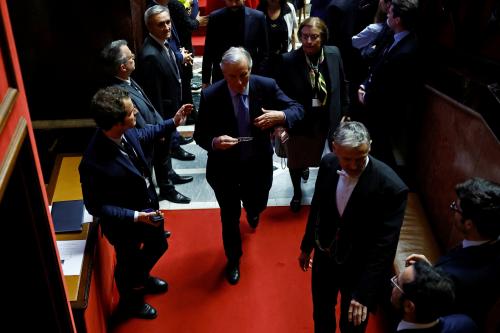
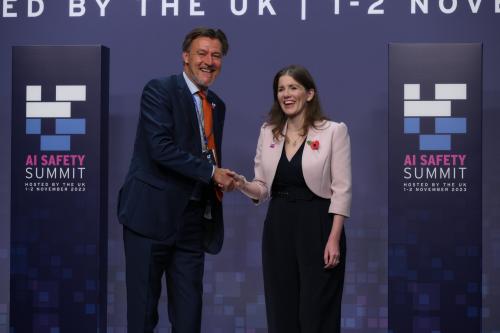
Commentary
“We lost an opportunity to listen to you”: Why Macron is embracing Eastern Europe
June 6, 2023